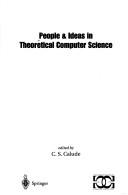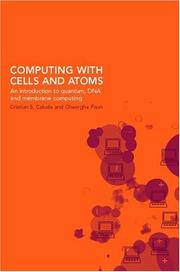| Listing 1 - 10 of 34 | << page >> |
Sort by
|

ISBN: 981402113X Year: 1999 Volume: *1 Publisher: New York Singapore Berlin Springer
Abstract | Keywords | Export | Availability | Bookmark
 Loading...
Loading...Choose an application
- Reference Manager
- EndNote
- RefWorks (Direct export to RefWorks)
Computer science --- Computer scientists --- Informatica --- Informatique
Book
ISBN: 303653475X 3036534768 Year: 2022 Publisher: MDPI - Multidisciplinary Digital Publishing Institute
Abstract | Keywords | Export | Availability | Bookmark
 Loading...
Loading...Choose an application
- Reference Manager
- EndNote
- RefWorks (Direct export to RefWorks)
Book
ISBN: 9789811232275 Year: 2024 Publisher: Toh Tuck Link, Singapore World Scientific Publishing
Abstract | Keywords | Export | Availability | Bookmark
 Loading...
Loading...Choose an application
- Reference Manager
- EndNote
- RefWorks (Direct export to RefWorks)
Book
ISBN: 3642135226 9786613564948 3642135234 1280387025 Year: 2010 Publisher: New York : Springer,
Abstract | Keywords | Export | Availability | Bookmark
 Loading...
Loading...Choose an application
- Reference Manager
- EndNote
- RefWorks (Direct export to RefWorks)
The 9th International Conference on Unconventional Computation, UC 2010, was organized under the auspices of EATCS and Academia Europaea, by the University of Tokyo (Tokyo, Japan), and the Center for Discrete Mathematics and Theoretical Computer Science (Auckland, New Zealand). It was held in Tokyoduring June 21–25,2010(seehttp://arn.local.frs.riken.jp/UC10/). The venue was the Sanjo (Hilltop) Conference Hall at Hongo Campus of the University of Tokyo. Hongo Campus was formerly the residence of the Maeda family, one of the richest feudal lords in the Edo period of Japan. The Japanese garden in the residence is partially preserved, including the pond and the hill on which the conference hall is located. Within walking distance from Hongo Campus are Ueno park with many museums, the Akihabara area, which is now the center of Japanesepop culture, and the Korakuenamusement park/baseball stadium. The International Conference on Unconventional Computation (UC) series (seehttp://www.cs.auckland.ac.nz/CDMTCS/conferences/uc/)isdevotedto all aspects of unconventional computation — theory as well as experiments and applications. Typical, but not exclusive, topics are: natural computing including quantum, cellular, molecular, membrane, neural, and evolutionary computing, as well as chaos and dynamical system-based computing, and various proposals for computational mechanisms that go beyond the Turing model.
Soft computing --- Computer science --- Engineering & Applied Sciences --- Computer Science --- Computer science. --- Computer programming. --- Computers. --- Algorithms. --- Mathematical logic. --- Artificial intelligence. --- Life sciences. --- Computer Science. --- Artificial Intelligence (incl. Robotics). --- Life Sciences, general. --- Programming Techniques. --- Computation by Abstract Devices. --- Algorithm Analysis and Problem Complexity. --- Mathematical Logic and Formal Languages. --- Biosciences --- Sciences, Life --- Science --- AI (Artificial intelligence) --- Artificial thinking --- Electronic brains --- Intellectronics --- Intelligence, Artificial --- Intelligent machines --- Machine intelligence --- Thinking, Artificial --- Bionics --- Cognitive science --- Digital computer simulation --- Electronic data processing --- Logic machines --- Machine theory --- Self-organizing systems --- Simulation methods --- Fifth generation computers --- Neural computers --- Algebra of logic --- Logic, Universal --- Mathematical logic --- Symbolic and mathematical logic --- Symbolic logic --- Mathematics --- Algebra, Abstract --- Metamathematics --- Set theory --- Syllogism --- Algorism --- Algebra --- Arithmetic --- Automatic computers --- Automatic data processors --- Computer hardware --- Computing machines (Computers) --- Electronic calculating-machines --- Electronic computers --- Hardware, Computer --- Computer systems --- Cybernetics --- Calculators --- Cyberspace --- Computers --- Electronic computer programming --- Electronic digital computers --- Programming (Electronic computers) --- Coding theory --- Informatics --- Foundations --- Programming --- Computer software. --- Artificial Intelligence. --- Software, Computer --- Tokio <2010> --- Machine theory. --- Life Sciences. --- Theory of Computation. --- Formal Languages and Automata Theory. --- Abstract automata --- Abstract machines --- Automata --- Mathematical machine theory --- Algorithms --- Logic, Symbolic and mathematical --- Recursive functions --- Robotics

ISBN: 0748408991 9780748408993 Year: 2002 Publisher: London: Taylor & Francis,
Abstract | Keywords | Export | Availability | Bookmark
 Loading...
Loading...Choose an application
- Reference Manager
- EndNote
- RefWorks (Direct export to RefWorks)
Book
Year: 2022 Publisher: Basel MDPI - Multidisciplinary Digital Publishing Institute
Abstract | Keywords | Export | Availability | Bookmark
 Loading...
Loading...Choose an application
- Reference Manager
- EndNote
- RefWorks (Direct export to RefWorks)
This book commemorates Solomon Marcus’s fifth death anniversary with a selection of articles in mathematics, theoretical computer science, and physics written by authors who work in Marcus’s research fields, some of whom have been influenced by his results and/or have collaborated with him.
Information technology industries --- Computer science --- automata theory --- formal language theory --- bio-informatics --- recursive function theory --- evolutionary processor --- network of evolutionary processors --- network topology --- theory of computation --- computational models --- intrinsic perception --- Hausdorff dimension --- fractal --- computational complexity --- Turing machine --- oracle Turing machine --- shortest computations --- quasiperiod --- formal language --- asymptotic growth --- polynomial --- membrane computing --- computational complexity theory --- P vs. NP problem --- evolutional communication --- symport/antiport --- Kolmogorov complexity --- random strings --- extractors --- finite languages --- deterministic finite cover automata --- multiple entry automata --- automata with “do not care” symbols --- similarity relations --- process calculus --- communication patterns --- control structures --- hypergraph model --- P systems --- cP systems --- NP-complete --- NP-hard --- SAT --- logarithmic time complexity
Book
Year: 2022 Publisher: Basel MDPI - Multidisciplinary Digital Publishing Institute
Abstract | Keywords | Export | Availability | Bookmark
 Loading...
Loading...Choose an application
- Reference Manager
- EndNote
- RefWorks (Direct export to RefWorks)
This book commemorates Solomon Marcus’s fifth death anniversary with a selection of articles in mathematics, theoretical computer science, and physics written by authors who work in Marcus’s research fields, some of whom have been influenced by his results and/or have collaborated with him.
automata theory --- formal language theory --- bio-informatics --- recursive function theory --- evolutionary processor --- network of evolutionary processors --- network topology --- theory of computation --- computational models --- intrinsic perception --- Hausdorff dimension --- fractal --- computational complexity --- Turing machine --- oracle Turing machine --- shortest computations --- quasiperiod --- formal language --- asymptotic growth --- polynomial --- membrane computing --- computational complexity theory --- P vs. NP problem --- evolutional communication --- symport/antiport --- Kolmogorov complexity --- random strings --- extractors --- finite languages --- deterministic finite cover automata --- multiple entry automata --- automata with “do not care” symbols --- similarity relations --- process calculus --- communication patterns --- control structures --- hypergraph model --- P systems --- cP systems --- NP-complete --- NP-hard --- SAT --- logarithmic time complexity
Periodical
Year: 1999 Publisher: Singapore Berlin New York Springer
Abstract | Keywords | Export | Availability | Bookmark
 Loading...
Loading...Choose an application
- Reference Manager
- EndNote
- RefWorks (Direct export to RefWorks)
Book
Year: 2022 Publisher: Basel MDPI - Multidisciplinary Digital Publishing Institute
Abstract | Keywords | Export | Availability | Bookmark
 Loading...
Loading...Choose an application
- Reference Manager
- EndNote
- RefWorks (Direct export to RefWorks)
This book commemorates Solomon Marcus’s fifth death anniversary with a selection of articles in mathematics, theoretical computer science, and physics written by authors who work in Marcus’s research fields, some of whom have been influenced by his results and/or have collaborated with him.
Information technology industries --- Computer science --- automata theory --- formal language theory --- bio-informatics --- recursive function theory --- evolutionary processor --- network of evolutionary processors --- network topology --- theory of computation --- computational models --- intrinsic perception --- Hausdorff dimension --- fractal --- computational complexity --- Turing machine --- oracle Turing machine --- shortest computations --- quasiperiod --- formal language --- asymptotic growth --- polynomial --- membrane computing --- computational complexity theory --- P vs. NP problem --- evolutional communication --- symport/antiport --- Kolmogorov complexity --- random strings --- extractors --- finite languages --- deterministic finite cover automata --- multiple entry automata --- automata with “do not care” symbols --- similarity relations --- process calculus --- communication patterns --- control structures --- hypergraph model --- P systems --- cP systems --- NP-complete --- NP-hard --- SAT --- logarithmic time complexity
Book
ISBN: 3642193919 3642193900 9783642193903 9783642193910 Year: 2011 Publisher: Berlin ; Heidelberg : Springer-Verlag,
Abstract | Keywords | Export | Availability | Bookmark
 Loading...
Loading...Choose an application
- Reference Manager
- EndNote
- RefWorks (Direct export to RefWorks)
This book is dedicated to Hermann Maurer on the occasion of his 70th birthday. The title word Rainbow reflects the beauty and variety of the achievements of this outstanding scientist, and also the diversity and depth of current research in computer science. The high admiration that Professor Maurer enjoys in the computer science community all over the world was witnessed by the enthusiastic response received to the request to contribute to this book. The contributors are leading researchers, also representing the diversity of computer science. The research areas included in the book range from Automata, Formal Languages and Computability to various aspects of the Practice of Computer Science, as well as from Algorithmics to Learning. The book consists of a brief Preface describing the achievements of Professor Maurer, followed by twenty articles roughly grouped together according to their topics. Most of the articles are written in a style understandable to a wider audience. The book is useful to anyone interested in recent developments in computer science.
Electronic data processing. --- Computer science. --- Informatics --- Science --- ADP (Data processing) --- Automatic data processing --- Data processing --- EDP (Data processing) --- IDP (Data processing) --- Integrated data processing --- Computers --- Office practice --- Automation --- Festschrift - Libri Amicorum --- Information theory. --- Logic design. --- Artificial intelligence. --- Theory of Computation. --- Logics and Meanings of Programs. --- Mathematical Logic and Formal Languages. --- User Interfaces and Human Computer Interaction. --- Artificial Intelligence. --- Computers and Society. --- AI (Artificial intelligence) --- Artificial thinking --- Electronic brains --- Intellectronics --- Intelligence, Artificial --- Intelligent machines --- Machine intelligence --- Thinking, Artificial --- Bionics --- Cognitive science --- Digital computer simulation --- Electronic data processing --- Logic machines --- Machine theory --- Self-organizing systems --- Simulation methods --- Fifth generation computers --- Neural computers --- Design, Logic --- Design of logic systems --- Digital electronics --- Electronic circuit design --- Logic circuits --- Switching theory --- Communication theory --- Communication --- Cybernetics --- Computers. --- Computer logic. --- Mathematical logic. --- User interfaces (Computer systems). --- Computers and civilization. --- Civilization and computers --- Civilization --- Interfaces, User (Computer systems) --- Human-machine systems --- Human-computer interaction --- Algebra of logic --- Logic, Universal --- Mathematical logic --- Symbolic and mathematical logic --- Symbolic logic --- Mathematics --- Algebra, Abstract --- Metamathematics --- Set theory --- Syllogism --- Computer science logic --- Logic, Symbolic and mathematical --- Automatic computers --- Automatic data processors --- Computer hardware --- Computing machines (Computers) --- Electronic calculating-machines --- Electronic computers --- Hardware, Computer --- Computer systems --- Calculators --- Cyberspace --- Machine theory. --- Human-computer interaction. --- Computer Science Logic and Foundations of Programming. --- Formal Languages and Automata Theory. --- Computer-human interaction --- Human factors in computing systems --- Interaction, Human-computer --- Human engineering --- User-centered system design --- User interfaces (Computer systems) --- Abstract automata --- Abstract machines --- Automata --- Mathematical machine theory --- Algorithms --- Recursive functions --- Robotics
| Listing 1 - 10 of 34 | << page >> |
Sort by
|

 Search
Search Feedback
Feedback About UniCat
About UniCat  Help
Help News
News